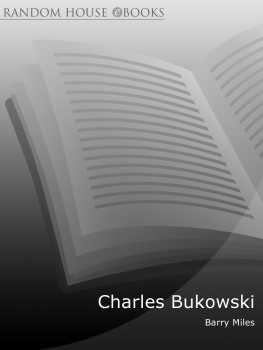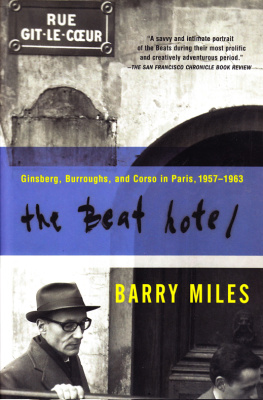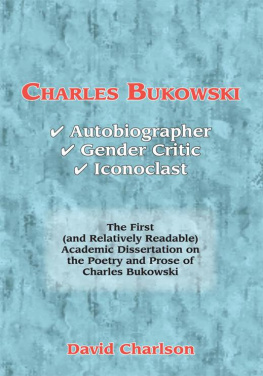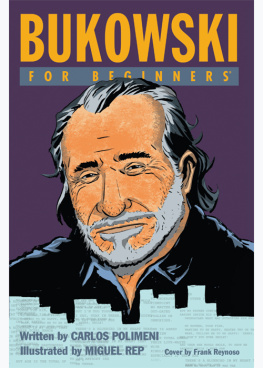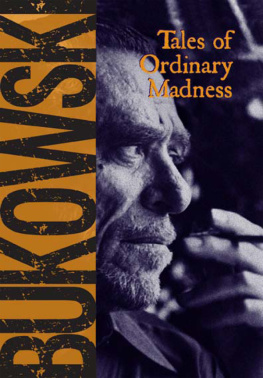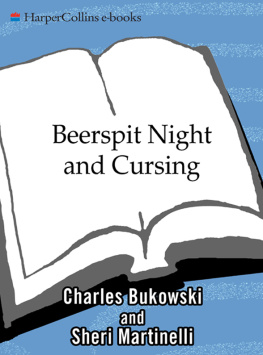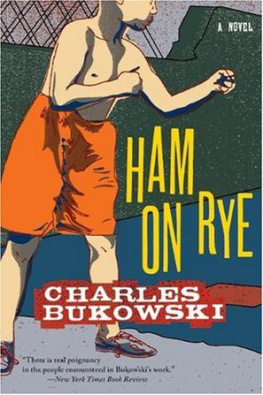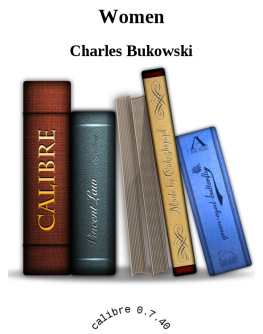CONTENTS
About the Author
Barry Miles is the critically acclaimed author of the biographies of Allen Ginsberg, Jack Kerouac and William Burroughs (all published by Virgin) and of The Beat Hotel. He also wrote Hippie and the authorised biography of Paul McCartney, Many Years From Now.
About the Book
Fear makes me a writer, fear and a lack of confidence
Charles Bukowski chronicled the seedy underside of the city in which he spent most of his life, Los Angeles. His heroes were the panhandlers and hustlers, the drunks and the hookers, his beat the racetracks and strip joints and his inspiration a series of dead-end jobs in warehouses, offices and factories. It was in the evenings that he would put on a classical record, open a beer and begin to type
Brought up by a violent father, Bukowski suffered childhood beatings before developing horrific acne and withdrawing into a moody adolescence. Much of his young life epitomised the style of the Beat generation riding Greyhound buses, bumming around and drinking himself into a stupor. His first story was published when he was 24 and his first poetry when he was 35. His novels have sold millions of copies worldwide in dozens of languages.
In this definitive biography Barry Miles, celebrated author of Jack Kerouac: King of the Beats, turns his attention to the exploits of this hard-drinking, belligerent wild man of literature. This is an essential addition to every Bukowski fans collection.
Also by Barry Miles published by Virgin Books:
BEAT COLLECTION
ALLEN GINSBERG: A BIOGRAPHY
JACK KEROUAC: KING OF THE BEATS
WILLIAM BURROUGHS: EL HOMBRE INVISIBLE
AUTHORS NOTE
Henry Charles Bukowski Junior was called Henry by his parents. His friends called him Hank, or sometimes Buke. He disliked being called Buck, as in fuck, Im Buke, like in puke. Both words, of course, would have appealed to him as a way of shocking the conformist neighbours. I shall call him Hank, throughout, in order to distinguish between father and son.
INTRODUCTION
IN THE EARLY 60s there were scores, if not hundreds, of small literary magazines with names like Wormwood Review, Dust, Ole and Nadada being published in America, often from small towns I had never heard of. They were occasionally hand printed, like the Outsider, often mimeographed, and almost always produced as a labour of love, usually by someone with a factory job, or sometimes by a sympathetic academic in a midwestern college. They were available from a dozen or so bookstores worldwide, but were mostly sold by mail order; many of them ran lists of other magazines that carried similar material, often with brief reviews of the latest issue. The same names of contributors occurred time and again, but none so frequently as Charles Bukowski.
From 1965 until 1970 I had a bookshop of my own and carried everything of Bukowskis that I could lay my hands on: books, magazines, and even a record. First we stocked the little mimeograph chapbooks, then the beautiful, signed limited editions from Black Sparrow. And in 1967 the underground newspapers began, together with a flood of small broadsides and pamphlets.
In 1968 I was made the label manager for Zapple, an experimental division of Apple, the Beatles record company. John Lennon and Paul McCartney asked me to record a series of poetry albums for them and so I prepared a list which included Lawrence Ferlinghetti, Richard Brautigan, Michael McClure, Allen Ginsberg, Kenneth Patchen and half a dozen others. High on the list was Charles Bukowski. All four Beatles gave the project their blessing so, in January 1969, I travelled to Los Angeles to make a spoken word album with him.
I arrived at 5125 1/2 De Longpre Avenue in a slummy part of East Hollywood near the 20th Century Fox Studios on Sunset in a rented green Mustang that looked gleamingly conspicuous in the shabby street. The single storey wooden-frame house had peeling paint and there were holes in the screen doors. Hanks house had a struggling hedge to one side, and his 57 Plymouth was parked on the patchy remains of his front lawn. The overflowing garbage cans had paper sacks filled with bottles and beer cans were stacked around them, awaiting collection.
The screen door opened straight into his living room. The shades were drawn. Rickety bookshelves were overloaded with books, magazines, old newspapers and racing forms. The settee had a hole where the stuffing was bursting out. There was a pile of car tyres in the corner and many empty beer cans. In another corner was Hanks desk with his huge, battered, sit-up-and-beg, black cast-iron Remington, dusty but for the carriage and keys, surrounded by cigar butts and ash, crumpled paper. Hank went straight down to the corner store and returned with a six-pack of Miller Light in glass bottles.
He was still working at the post office and wondering if it would ever be possible for him to make it as a professional poet. Essex House had just published Notes of a Dirty Old Man, a collection of his underground press columns, as a mass market paperback and he had been encouraged by this latest development.
We talked about the record. He was casual, relaxed and said that he had made a lot of home recordings before but he had not yet done a public reading. He hated the idea of performing in public. He said it was show business, an ego trip, but actually he was also shy, and concerned that he would make a fool of himself. I was unable to persuade him to come to a recording studio, unknown territory with ample opportunities for him to embarrass himself. He wanted to make the record at home, alone: Sure, just show me how the machine works and come back in a few days. Ill just curl up on the rug with some packs of beer, my books, turn on the machine and I wired up an Ampex 3000, arranged a microphone stand and microphone, headphones and twelve reels of blank tape. He refused to allow me, or anyone else, to be present to supervise the recording, saying he was too shy.
When I returned a week later, Hank was looking a bit hungover. There was a middle-aged woman with him, in black fishnet stockings and a black slip. She disappeared into the bedroom without speaking, emerging some time later ready to leave, looking tired and worn-out. Hank crushed some notes into her hand. Car fare, he said, as much to me as to her. Nothing in the room had changed. The Ampex was where I had left it and, for a moment, I was worried that he had not recorded anything. But it was done. He had filled every reel with the poems and stories that we had selected: six hours of his favourite pieces. In fact he had attempted to record on the other side, not realising that professional tape recorders do not work like that, and he had, therefore, inadvertently wiped his first recordings. He said to be sure to listen to the story called The Fire Station as he liked that best of all.
I thought the results were wonderful, a mix of poems and stories perfect for the series I had planned. We called it At Terror Street and Agony Way. Unfortunately, before I even had time to edit the tapes, the Zapple label was closed by the Beatles new business manager Allen Klein and the poetry recordings were left unedited and unreleased. Over the years I managed to get most of the tapes out on other labels, but it was not until 1993 that At Terror Street and Agony Way finally reached the stores as a double CD on the King Mob label. Sadly, even that is now unavailable.
In rereading Hanks books for this biography I found that his work was still fresh, it has not dated, it goes straight to the point. He gave a voice to the disenfranchised, the marginalised, the mad and dysfunctional, the factory hand, the working people, the drunk and disorderly. He made a point of always trying to write clearly so that people knew exactly what he was saying. He did not use a dictionary. He avoided long words and tried to use the easiest, simplest words possible. He told Jean-Francois Duval: I like it raw, easy and simple. That way, I dont lie to myself. In other words, he told the truth.
Next page
